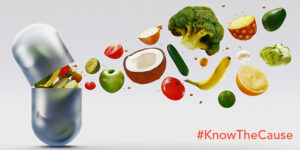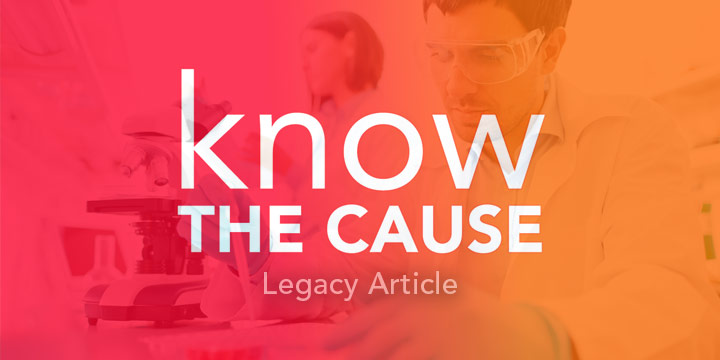

Veterans of Know the Cause know that meat is a cornerstone of eating on the Kaufmann 1 diet. Meat constitutes a significant percentage of the calories you will consume on the diet, and while other diets will tell you to avoid meat – especially red meat – the Kaufmann 1 actually advises the opposite. This comes with a couple caveats; along with the recommendation to include a copious amount of animal protein in your diet, be sure that, if it is possible, the meat you buy is organic and, in the case of beef, grass finished.
The organic part of this recommendation is easy to understand. Meat labeled organic is raised without antibiotics. Antibiotics are mycotoxins, a specific type of poison that the Kaufmann 1 diet seeks to limit exposure to. Animals raised with the aid of antibiotics pass those drugs through in the food chain. For this reason, it is best that the meat you buy be organic. With the rising popularity of “going organic”, most grocers should carry organic meats, and some such as Whole Foods carry almost exclusively organic. The price is a little higher but ultimately worth it.
The grass-fed part of that recommendation is a bit more complex. Within the last few years, grass-fed beef has gained quite a bit of popularity, especially following some great books by Michael Pollan and documentaries such as Food, Inc. Eating beef that is grass fed is important for a few reasons.
First, let’s clear up some confusion. Often times we talk about “grass fed meat”, and people assume that means that all kinds of meat are to be grass-fed. People have asked, where do we find grass-fed chicken? Chickens don’t eat grass. Neither do fish. Neither do turkeys. Neither do pigs, exclusively. The idea behind grass-fed beef is that a cow’s natural diet is grass. When buying any sort of meat, it is best to try to find meat from animals that were fed their natural diet. Chickens are pasture animals – they forage for bugs and whatever else they can find. Depending on the kind of fish in question, a fish’s diet will range from plankton to other fish. Regardless of what they eat, it is important for each animal to consume a diet that is natural to their species.
Cows are ruminants; they have a digestive system specifically designed to digest grass. Before cows were domesticated, they would have never eaten corn. Cows are grazers that live in herds, similar to deer. Cows aren’t the only animals classified as ruminants; bison and sheep are ruminants, as well. These animals are not biologically optimized to consume corn and grain – the most common feed given to conventionally raised animals. Part of the philosophy behind going “grass-fed” is that when an animal eats its natural diet, that animal will achieve optimum health, and the meat the animal yields will provide the most health benefits for the people that consume it. And there is scientific evidence to back this claim up.
Cows that are grass-fed have a much higher ratio of Omega 3 fatty acid in their fat. Cows fed corn have a much higher proportion of Omega 6. Consumption of higher ratios of Omega 6 is associated with inflammation in humans. Since we now know that inflammation is linked to virtually every kind of autoimmune disease, could it be that the way we’ve been raising our beef is responsible for any ill health effects it has rendered?
Visibly, grass-fed beef looks different than conventionally raised beef. The fat is much darker and orange in color; this is due to the presence of beta-carotene. Cows fed grass consume a higher amount of vitamins, minerals and trace minerals; the meat is a dark, rich red color. Not least in importance is the difference in flavor; grass-fed beef has a stronger, richer flavor than conventionally raised beef.
There are, however, some distinctions between different kinds of grass-fed beef. More farmers have realized that there is demand for grass-fed beef, and have been rushing to get their meat labeled as such. Many farmers now raise cows on grass, but will feed them a corn diet in the final month before slaughter; this method helps put weight on the animals more quickly in their final month, rendering more meat to be sold and a greater profit to be made – all while maintaining the grass-fed label. This raises a few problems; cows fed a corn diet in their final months will be exposed to the mycotoxins that contaminate their feed, passing those along to whoever eats their meat. Their meat is still healthier than conventionally raised cattle, but it carries the risk of mycotoxin exposure.
You will still reap some benefits from eating this kind of beef. However, the best kind you can buy is meat that is not only grass-fed, but grass-finished. This type of beef is never fed corn. but lives on its natural diet until it is taken to slaughter.
Talk to your local grocer about the kinds of meat they carry. Even better, purchase directly from a local farmer who understands this philosophy. Buying directly from such farmers works to stimulate your local economy and promotes healthy, sustainable practices. Most importantly, you will be giving yourself and your family the best, delicious, health-promoting meat available.
Doug Kaufmann has written many books that cover a full range or health issues. Find out which of his books best suits you by clicking the button below.
Doug Kaufmann developed his diet after years studying the clinical effects of pathogenic fungi on the body. Fungi and yeasts can become parasitic organisms on and inside our body, causing health problems that can be difficult to diagnose. Learn more about the Kaufmann Diet, change your life and know the cause.
We encourage all visitors to this site to take some time and study these technical articles prior to initiating lifestyle changes, including dietary changes and to do so with their physician’s awareness and approval. The articles posted in this link are scientific and with few exceptions are taken from medical journals familiar to healthcare workers.
Looking for help assembling antifungal Kaufmann Diet approved recipes for breakfast, lunch or dinner? We have several videos, books and recipe write ups here on Know the Cause that will help your health journey. The recipes in this section are so good, you’ll feel like you’re indulging. No sacrifice needed! Enjoy.
© 2024 Mediatriton Inc. All Rights Reserved • Website by Skynet Solutions